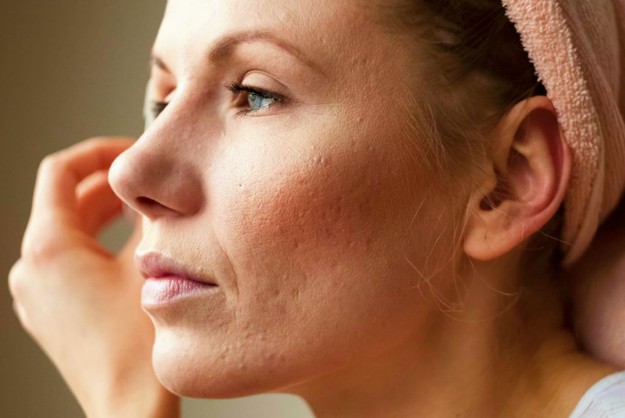

Knowing what causes acne is the first step to addressing it. Here, we answer your questions about this skin aggravating condition.
In this article:
- What Is Acne?
- Are Acne And Pimples The Same?
- What Are Symptoms Of Acne?
- What Causes Acne?
- What Are The Causes of Acne Breakouts?
- How is Acne Managed?
What Causes Acne And How To Make It Better
What Is Acne?
Simply put, acne is a skin condition that causes inflamed, red pimples and dark spots on the face. It usually affects the face, forehead, upper back, shoulders, and even the chest.
Acne is the most common skin problem today – which is most likely why it is often called “common acne.” In fact, it affects as much as 50 million people every year in the United States alone.
While almost everyone experiences it at some point, it is most common in adolescents and teenagers. In the US, as much as 85% of people aged 12-24 years old experience acne.
Without proper medical care, acne can leave a lot of scars.
Are Acne And Pimples The Same?
While people often use the two interchangeably, acne and pimples are not the same.
A pimple is a single bump on your skin that is filled with pus. It develops when the oil your body produces, along with bacteria and dead skin cells, clog your pores. This leads to swollen, red lesions that are filled with pus.
Having pimples is a symptom of acne. As defined above, however, it is not the same. Acne is a severe case of pimples, mostly combined with whiteheads and blackheads.
What Are Symptoms Of Acne?

The most common symptoms of acne are papules (basically pimples without pus at the tip), pimples, whiteheads, and blackheads.
In worse cases, however, large, solid and painful lumps called nodules start to appear on the surface of the skin. There are also cases when people with acne develop painful and pus-filled cystic lesions just beneath the skin.
What Causes Acne?
In general, what causes acne is the clogging of pores. The pores on your skin are openings to follicles that are made up of hair and sebaceous or oil glands. These glands primarily function to produce oil or sebum that keeps the skin soft and lubricated and serves as protection from the dirt and grime you encounter every day.
During adolescence, the body produces high levels of the hormone androgen. This hormone signals the body to produce more sebum, usually triggering the start of acne.
The excess oil, dead skin cells, and bacteria are trapped inside the pores, blocking the follicles. If that plug is covered by a thin layer of skin, it grows into a whitehead. If it is exposed to air, the plug’s darker portion is what we call a blackhead.
The trapped follicle continues to produce oil under the skin, causing it to slowly grow and enlarge into a bump. The follicle’s walls eventually rupture, allowing the entry of bacteria into the deeper layers of the skin which becomes inflamed and grows into a pustule. A deeper inflammation grows into a pimple, and an even deeper one grows into a cyst.
What Are The Causes of Acne Breakouts?
As mentioned above, hormones are the primary triggers for breakouts. They cause the follicles to produce more sebum, leading to clogged pores. The clogged pores then lead to breakouts. Other factors that could contribute to acne breakouts include:
- Heredity – Acne can be genetic. If either of your parents has or had acne, chances are you might eventually have it, too.
- Occupation – Your occupation could be the cause of your acne if it exposes you to harmful chemicals or industrial products such as cutting oils.
- Drugs – Steroids and similar products often used by bodybuilders can cause hormonal changes that trigger acne. Anticonvulsant drugs and lithium can also cause acne.
- Cosmetics – There are many cosmetic products that can clog your pores. A water-based product is usually the go-to option when it comes to choosing these products.
- Stress – Though stress does not directly cause acne, it can worsen the condition for someone who already has it. A 2003 study published in the Archives of Dermatology found that the acne of college students flared up during exams period. It was during those times that they reportedly had more stress.
How is Acne Managed?

“Will pimples go away on their own?” Unfortunately, the answer is no.
There are numerous over-the-counter medications for acne that are available in your local drugstore. Look for medications that contain benzoyl peroxide, sulfur, resorcinol, and salicylic acid. These ingredients help dry out existing pimples, kill acne-causing bacteria, open pores, and put a stop to the clogging of the skin’s pores.
If that does not work, consult your doctor. You might need oral or topical antibiotics and creams which are stronger than the over-the-counter medications instead. They kill bacteria that cause pimples and also reduce the production of oil.
For women with hormonal acne, doctors may also prescribe birth control pills or spironalactone that help regulate hormones.
In more severe cases, dermatologists may resort to procedures to address acne and avoid scarring:
- Photodynamic therapy – This procedure utilizes medication and laser therapy to reduce bacteria and oil production.
- Dermabrasion – This procedure is often used more for eliminating scarring than the acne itself. It uses a rotating brush to remove the top layers of the skin. A milder version of this called microdermabrasion helps remove dead skin cells and open pores.
- Chemical peel – The procedure essentially peels off the top layers of the skin to reveal the less damaged skin underneath.
- Cortisone injections – If the acne consists of large cysts, dermatologists may consider cortisone injections. This help reduce inflammation.
How Can I Keep Acne From Occurring?
- Wash your face twice a day with a mild facial wash. This should help remove excess oil, dead skin cells, bacteria and dirt that could cause pimples.
- Shampoo your hair every other day. Additionally, make sure to keep it out of your face.
- Avoid touching your face. Your hands carry a lot of bacteria that may transfer to your face if you keep on touching it.
- Do not pick or squeeze pimples as this could spread bacteria and excess oil. Additionally, squeezing your pimples may also cause scarring.
- Look for cosmetic and skin-care products labeled “water-based” or “non-comedogenic”. These products are milder on your skin.
Watch this video to learn more about the causes of acne from Mic the Vegan:
Acne is a skin condition that affects almost everyone at some point in their lives. Knowing what causes acne is the first step in addressing it. Proper skin care may help manage it. Hopefully, our article was able to answer your acne-related questions.
Do you have other questions about acne that we could help you with? Ask us in the comments section below!
Up Next: Vitamin E For Skin | Why You Need It And Where You Can Get It
